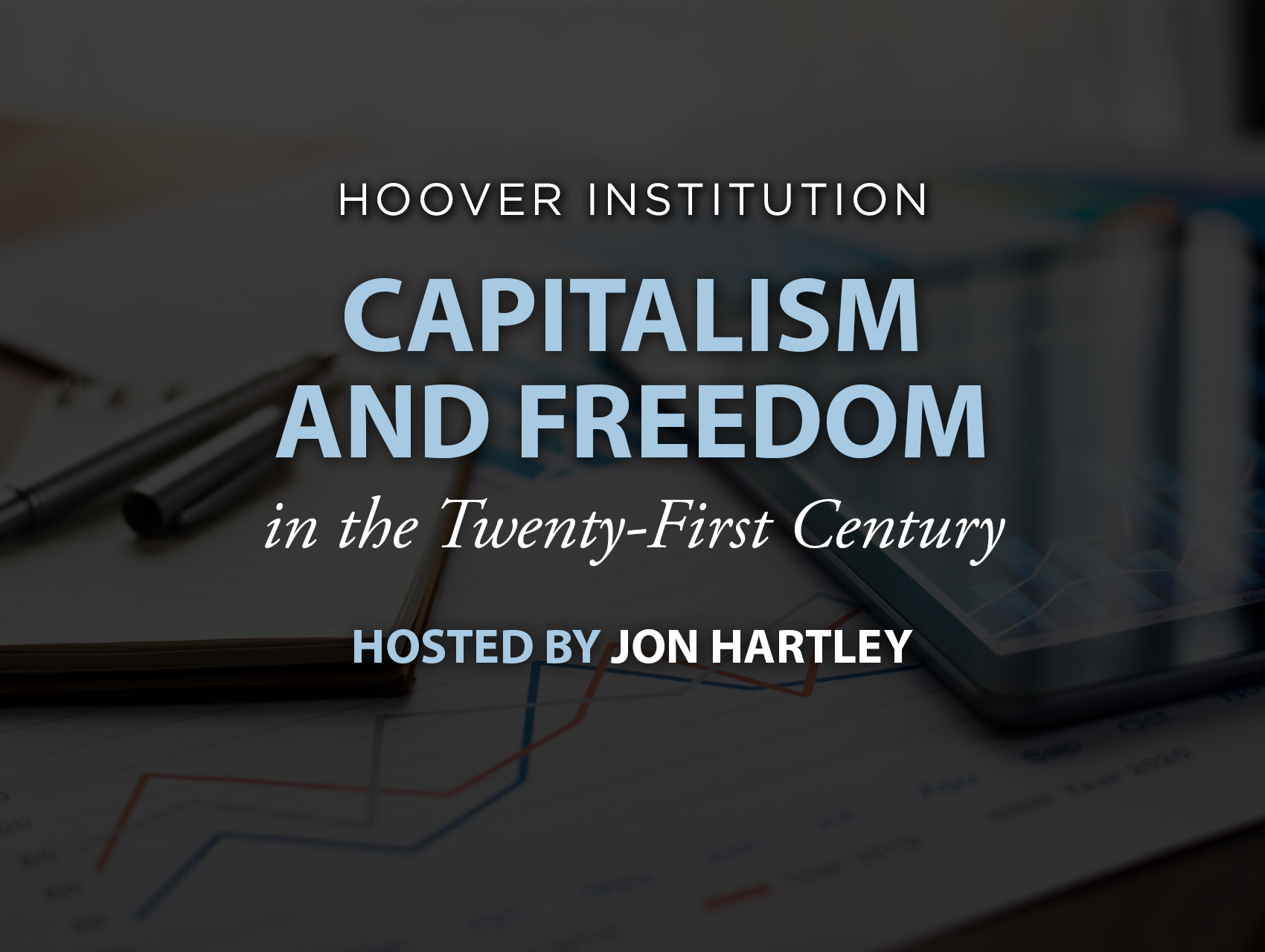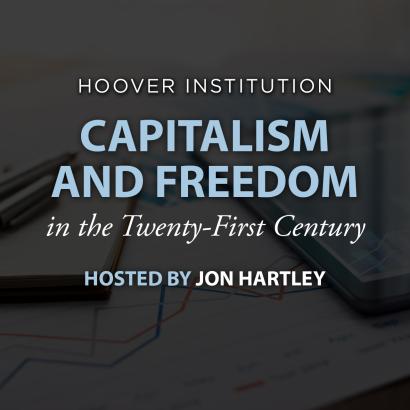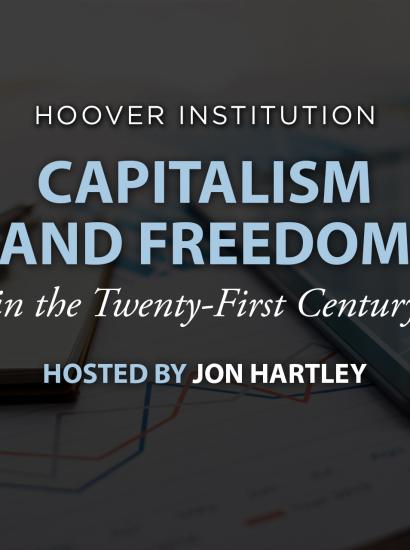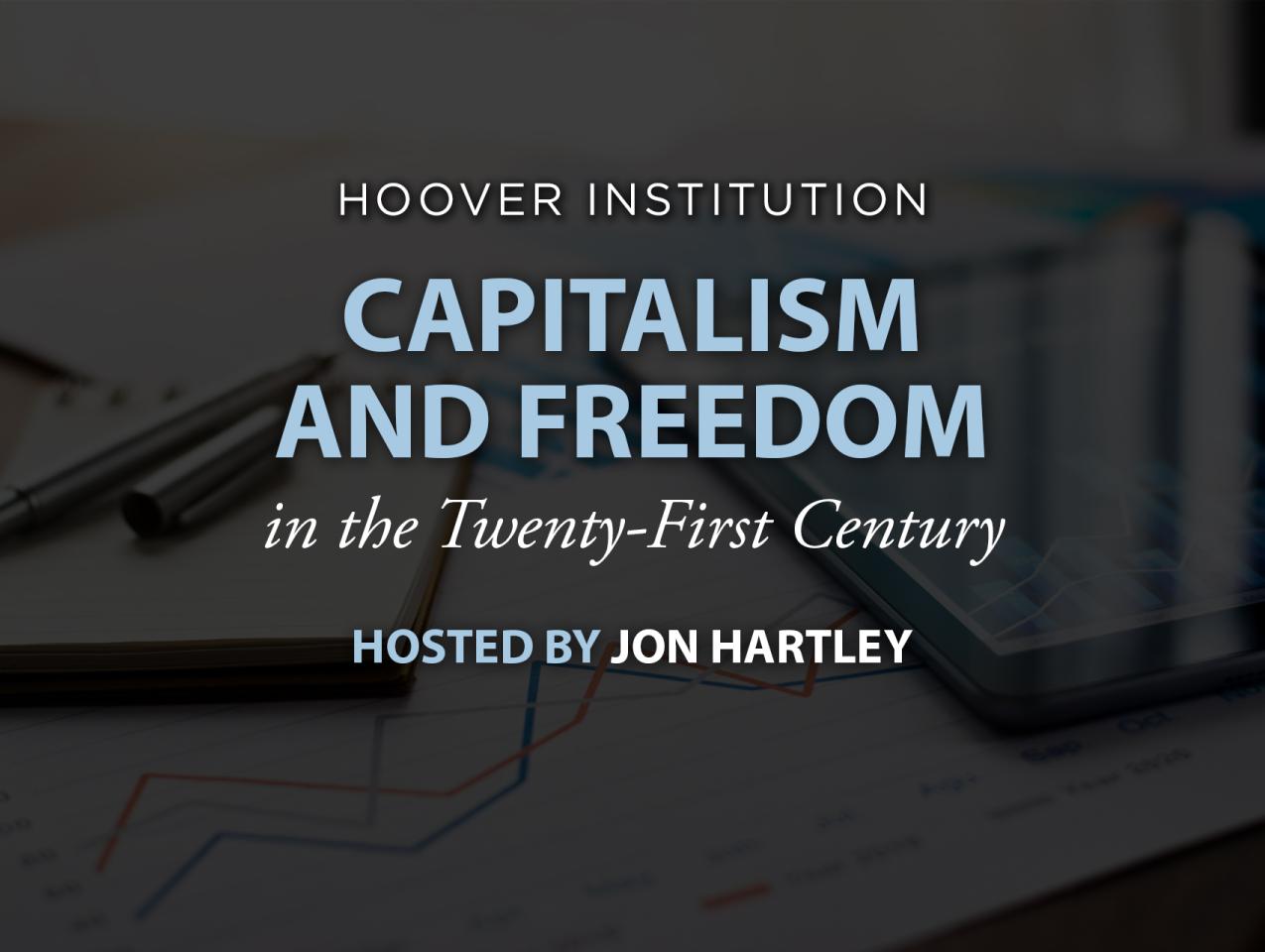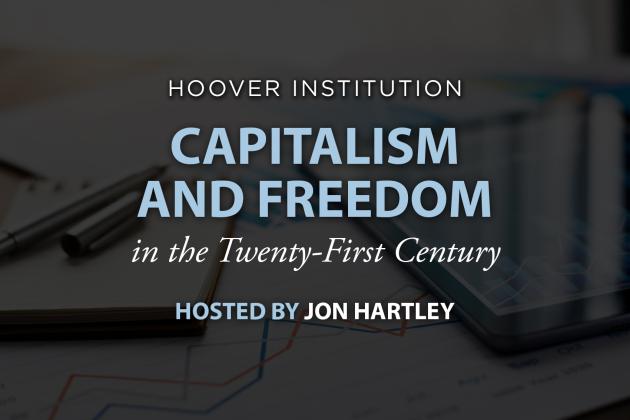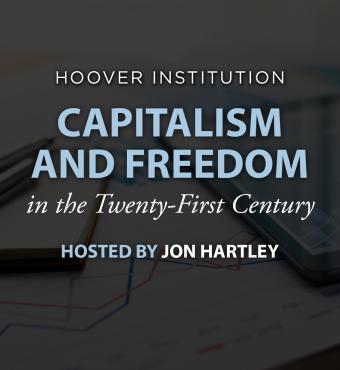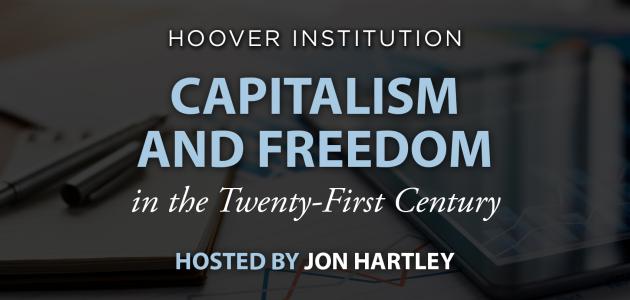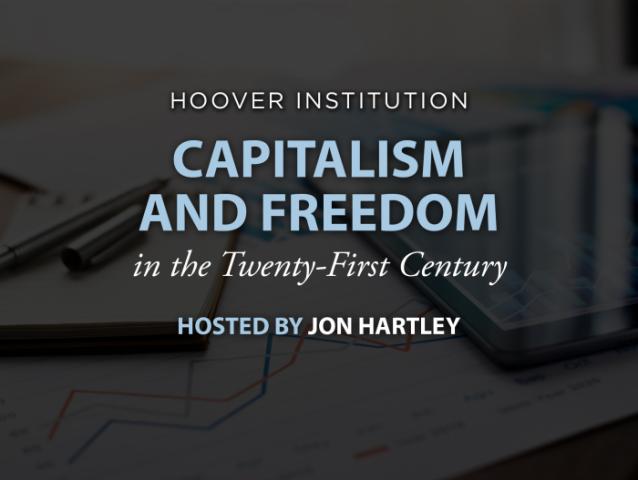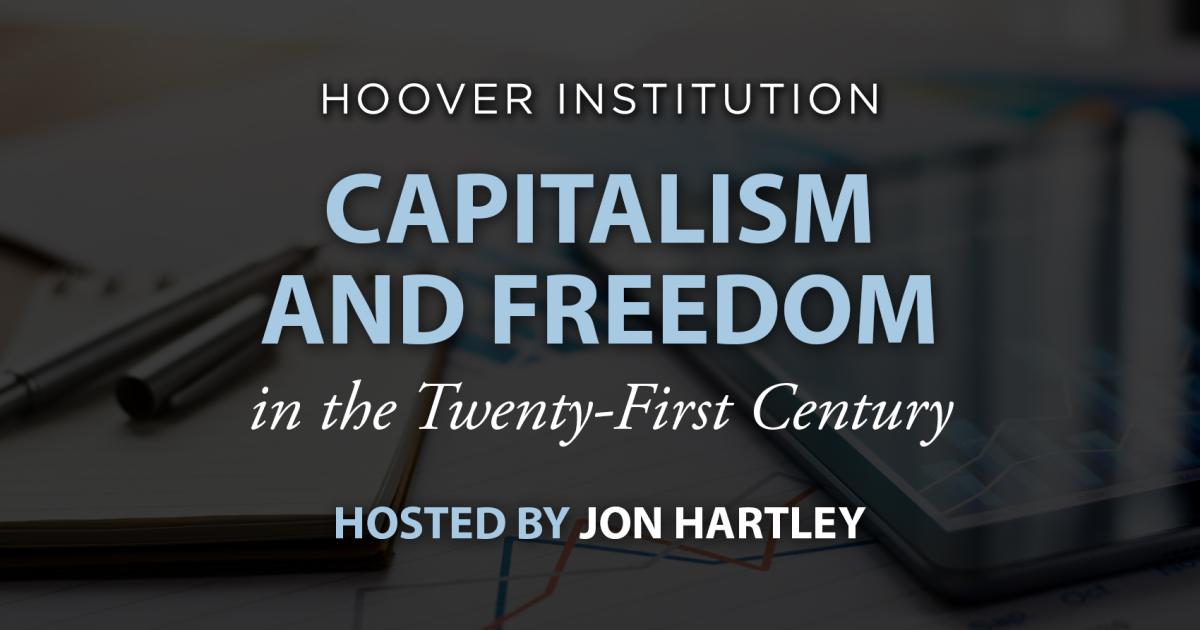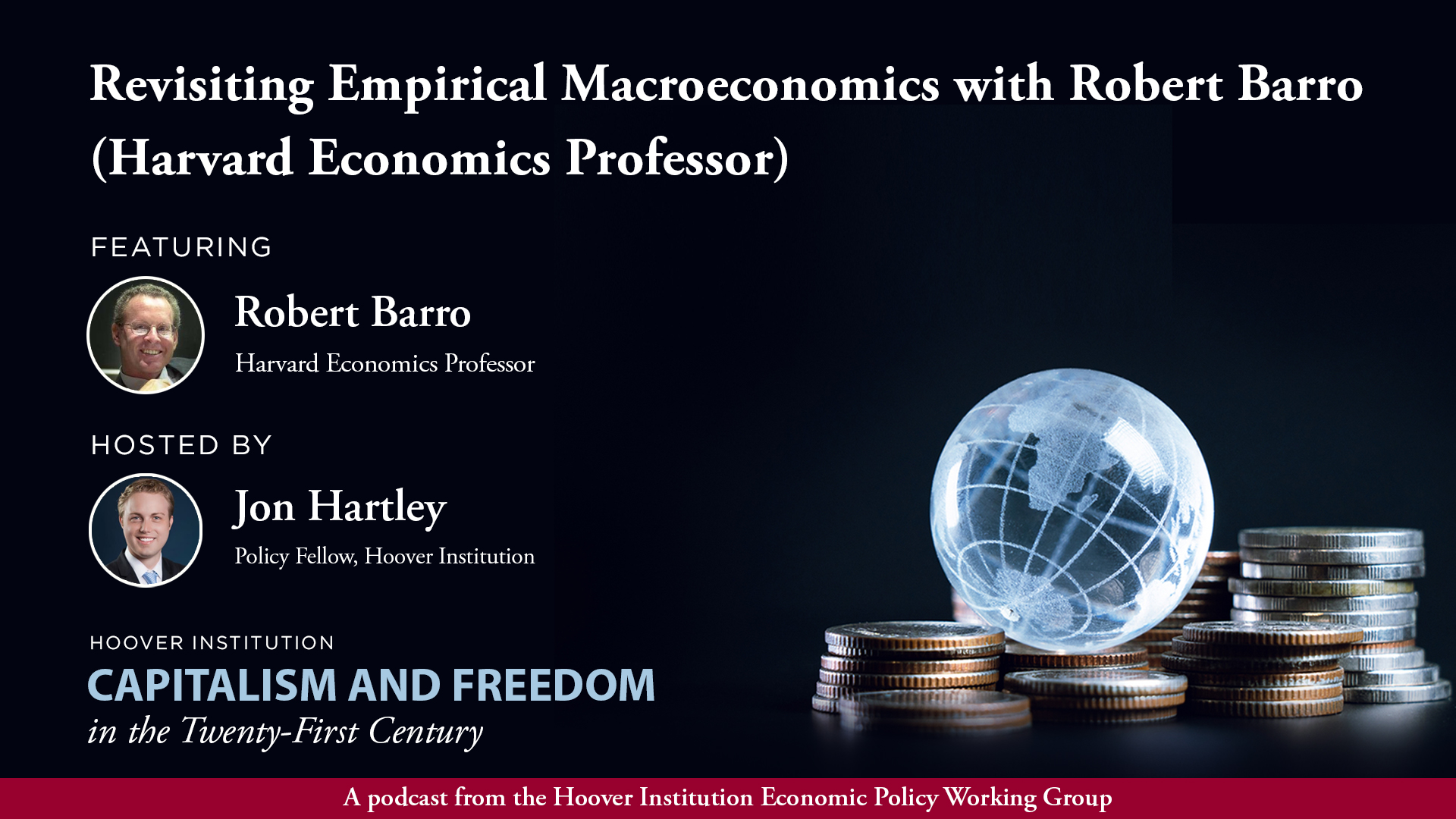- Economics
- Monetary Policy
- Answering Challenges to Advanced Economies
Jon Hartley and Robert Barro discuss Robert’s career in economics including his long list of famous students, and research on Ricardian equivalence, fiscal theory of the price level, government spending multipliers, business cycles and the legacy of New Keynesian modeling, economic growth, political economy, the interplay between religion and economics, and much more.
Recorded on March 18, 2025.
WATCH THE EPISODE
Jon Hartley: This is the Capitalism and Freedom the 21st Century podcast, an official podcast of the Hoover Institution Economic Policy Working Group where we talk about economics, markets and public policy. I'm Jon Hartley, your host. Today, my guest is Robert Barro, who is an economics professor at Harvard University. He's widely regarded as one of the founders of new classical macroeconomics, having done incredible path breaking work in the empirics of economic growth, Ricardian equivalence and many, many other areas. Welcome, Robert.
Robert Barro: Hello, great to be here.
Jon Hartley: Robert, I want to first get into your early life. You were born in New York City and you were a physics undergrad at Caltech and were a Richard Feynman student in the 1960s and then you transitioned to economics, into doing a PhD in economics at Harvard, graduating in 1970. What was it that first got you interested in economics?
Robert Barro: Well, I didn't know anything about economics when I started as an undergraduate and Caltech didn't offer any economics to speak of. They only had a couple of courses. My brother was an economist and he gave me some influence and I finally took a course in my junior year and surprisingly enough it was on Keynesian economics.
It was straight out of the general theory, but I loved the class when I saw it. And I particularly appreciated the combination of technical material which I was doing a lot of when I was in physics with applications and particularly uses in a policy context. So the combination of those two things I think is what especially attracted me.
Jon Hartley: Well, I know your PhD advisor was Zvi Griliches at Harvard and you returned to Harvard in its economics department in the 1980s, where you've been since. I mean, how has the department changed since you were there as a graduate student? I mean, obviously there were a lot of changes. I guess there was perhaps at that time a lot of, when you were a graduate student, a lot of sort of old Keynesian economists at Harvard. Harvard and MIT have sort of historically been, I think well known for having folks like Alvin Hansen, who kind of brought a lot of Keynes ideas to the United States versus obviously University of Chicago, Minnesota, other so called freshwater places being, you know, having a bit of a different perspective, being, you know, more, more so the home of sort of new classical economics, the Chicago School and so forth.
How exactly did you know you end up there when you're a graduate student? What brought you back as a professor? Given that, I think it's fair to say that a lot of your work and ideas are somewhat in contrary to that sort of Keynesian tradition at Harvard?
Robert Barro: I think it's fair to say that when I was a graduate student at Harvard, it was a low point for the faculty in terms of the economics department. It just was not a very good department. And it had been sort of going downhill for some time. And that was more dominant than the question about whether it was Keynesian or not Keynesian.
It really wasn't imparting a good instruction, and it was particularly weak in macroeconomics. And I was working on hyperinflation and macroeconomics more broadly, and I had a very tough time finding a thesis advisor. So it ended up being the case that I was in my third year and I'd gotten a lot of work done in terms of particularly of the German hyperinflation, and I had some papers ready. But I decided I should try to get a job, even though I didn't have a thesis advisor or a thesis. And somehow I managed to get a job at Brown University as an assistant professor without having a doctorate or even a thesis advisor. But that actually was a sensible thing to do. It actually worked out. But at some point I decided I better finish up and I needed to get an advisor. Meanwhile, Harvard had hired some really great professors all at once. Ken Arrow, Dale Jorgensen, Marty Feldstein, and Zvi Griliches. They were all hired just about the same time toward the end of my graduate education.
So I decided I should get one of these new people to be my advisor, even though they might not fit exactly by fields. And at some point I had an appointment with Zvi Griliches, and I talked to him for half an hour about the work I was doing, and some of it was in econometric applications, which fit with his expertise.
So even though he wasn't a macroeconomist, it actually worked out for him to be my advisor and he was great. And he told me at some point that his whole career he'd really only had two PhD students in macroeconomics, and the other one was Bob Lucas. So I thought that was pretty good.
So I was very happy with Zvi as my advisor, and I ended up finishing up there.
Jon Hartley: Well, that's terrific. And I'm curious, where were you when the Rational Expectations revolution was happening? Obviously, when I think about the history of macroeconomic thought and how it kind of evolved in the late 20th century, you had this thing, which was the Rational Expectations revolution, micro foundations and so forth.
That came out of largely the Midwest, University of Chicago, Minnesota and elsewhere in this, really starting the 70s. And then over time, it wasn't really until that that caught on and I think pretty successful in terms of changing, at least influencing research in the sort of the subsequent couple of decades. And in part that was a response to, I guess, Keynesian models being unable to explain rising inflation and output falling during that period of time, the 70s and 80s. But, later on, Harvard sort of caught up and the New Keynesian sort of tradition kind of emerged where they took all the rational expectations micro foundations theory that had been developed by Lucas, Sargent, Prescott and others, and then inserted frictions, nominal rigidities and so forth.
So folks like Greg Mankiw, Rich Clarida, Jordi Gali, Mike Woodford, and so forth, and many others. I mean, where were you during that period of time in the rational expectations of revolution?
Robert Barro: So in the mid-1970s, I left Brown University. I took a position in Chicago. Milton Friedman was still there, and I particularly interacted with him and with Gary Becker and George Stigler. So I worked in that period particularly on Ricardian Equivalence, which has some relation to rational expectations, of course, and I worked a lot on empirical things related to some of Bob Lucas's work. But Lucas actually went back to Chicago a little bit later. And the second time I was in Chicago is when I particularly interacted with him.
So it was in that period from the mid-70s through the mid-1980s, where part of the time I was in Chicago and part of the time I was interacting with Lucas. So that's some of that period.
Jon Hartley: So I guess diving into some of your research here and talking about Ricardian Equivalence, it's this idea that temporary tax cuts shouldn't affect consumption, that debt and taxes are interchangeable and that you wrote this very famous paper, I think the 1970s, this titled “Are Government Bonds Net Wealth”?
And your answer to that is no. And the idea is that government bonds are substitutable with taxes and it's largely the path of spending that matters and that, you know, agents and consumers will smooth, they'll just save more in response to something like the government issuing more debt or running in a deficit.
And so I think it has a lot of implications for deficit spending. Governments trying to use deficit spending to juice aggregate demand, which is still a very popular policy approach by governments. Curious, what gave you this idea to study Ricardian Equivalence? It was something that David Ricardo had discussed, but something that I think had grown dormant for quite some time. What led you to studying that as well as other forms of equivalents. You've written papers about government debt management, I think arguing that government debt management, maturity choice doesn't really matter for non-contingent debt. What led you to this sort of line of thinking? Was it those interactions with Lucas or was it something else?
Robert Barro: No, not something with Lucas, which would have been later. But Ricardo and equivalence is important as kind of a baseline idea that under certain circumstances you get this fairly set of extreme results and then it forces you to think in a disciplined way about why should you have departures from that and in what direction are the departures going to be? And certainly Ricardian equivalence doesn't always hold, but that doesn't mean the kind of standard analysis of fiscal deficits are valid and things can go even in the opposite direction. And I had a second paper in end of the 1970s about tax rate smoothing, which was about the function of public debt as a device for financing basically temporary government expenditure.
And from a public finance viewpoint it was important that that method of finance was available. And in that sense the debt is not irrelevant. And it probably underlies why Britain did so well in financing wars over a couple of centuries because it provided a very convenient method of financing.
So certainly you don't have Ricardian equivalence there, but it becomes kind of a part of public finance in terms of what's the optimal structure of taxation over time. And the public debt management is part of that problem. I gave a seminar on my Ricardian equivalence paper only once, and Friedman, Becker and Stigler were there at the same time, which is the only time I've seen the three of them together at a seminar, actually.
Jon Hartley: Wow.
Robert Barro: That was very exciting. And I got some important feedback there and then from Gene Fama when I gave the paper in the business school in Chicago. And those are the only two times I gave a seminar on that paper which proved very influential. So I didn't know when I wrote the paper that it had something to do with David Ricardo. And I didn't call it Ricardian equivalence. That came from Jim Buchanan, who wrote a comment on my page paper and he said, all this is Ricardian equivalence. And then I decided, well, it must be that there was an earlier statement of this, before David Ricardo, that you can always go back and find stuff. And then I looked into that. In fact, I couldn't find any sensible thing before Ricardo that had this viewpoint. So then I decided Ricardian equivalence was a really good name and we should adopt that which subsequently became the case.
Jon Hartley: Well, I'm curious, how do you feel about I guess criticism from empirical economists who kind of say, well, Ricardian equivalence, it's wrong and they point to maybe some data about some micro data maybe that shows that consumers aren't fully smoothing.
I think if you look at the macro data, like the 2008 tax rebates in the US or the 2020, 2021 stimulus checks in the US, it's pretty clear that they're largely being saved. So I think at the macro level, there's a lot of smoothing that's going on. But I don't think it's necessarily full smoothing and perfect smoothing either. I'm curious, is it really just the being an important baseline that's important, or do you think that a lot of empirical economists out there, particularly on the maybe applied micro side of things, that they're using microdata to estimate MPCs or to look at consumer spending responses to fiscal policies, do you think that they're missing something?
Robert Barro: Well, I think it's certainly fair that there can be departures from complete smoothing and there are good reasons to have certain kind of frictions and informational issues that can produce those kinds of effects. It's certainly not systematically the case that fiscal deficits produce the kinds of Keynesian responses that are often predicted.
And some of the departures from Ricardian equivalence can go in the direction opposite to the one that you would normally expect to find. Again, in terms of the tax smoothing, I found it more productive to think about that as a positive theory about how the government is managing the debt.
And in that context, it certainly matters. And there's a lot of literature along those lines in terms of the public debt as a kind of part of optimal tax problems, which I think is a good way to look at it.
Jon Hartley: So I guess I want to talk just a little bit about government spending multipliers, because it's a related issue.
In 2011, you got into this literature, you published this Quarterly Journal of Economics paper with Charles Redlick, since become, I think, a very famous paper titled “Macroeconomic Effects of Government Purchases and Taxes”. And you find that government spending multipliers are low and below one. And that's consistent with other work that's done by Hoover's very own Valerie Ramey.
And you found that tax multipliers are a bit higher. And you're, you're largely using government military purchases, military spending for exogenous identification. I'm curious, what's your intuition for why this is the case that government spending multipliers are so low in the, in the macro data and, and that the tax multipliers are actually somewhat higher?
I know Alberto Alsina found a similar thing looking at fiscal consolidations with his co-authors, but I guess I'm curious because I feel like this is definitely one of the most hotly debated topics in macroeconomics where it feels like, there is progress being made, but it's still a hugely contentious debate.
I think that empirical macro people tend to say one thing, whereas the applied micro people, which might look at, you know, say tax lotteries or something of that nature, using more, more micro level data, find that MPCs are very high and that government spending multipliers are much higher than, than one.
I'm curious what you think about that tension and where you think that the truth is in all this.
Robert Barro: Looking at the variations in military spending in the US context over a fairly long time period is a very good setting for trying to isolate spending multipliers associated with basically exogenous movements in the amount of government expenditure.
You wouldn't do this for many countries during wartime because the direct destructive effects of wartime tend to be dominant. And typically in wartime you would estimate negative spending multipliers associated with military outlays. But the US is different in that respect. It doesn't have that kind of massive destruction associated, particularly with World War II.
So it was a very good setting, I think, for looking to isolate the effect of these exogenous and large spending changes. So the multipliers were positive. I mean, the right baseline is 0, not 1. If the multiplier is 1, it means you're basically getting as much output as you're using up, which makes it sound like it's a free thing.
Jon Hartley: Guess, if G is included in, in GDP, right? You should, some would argue that there's been this big debate recently about whether G should be included in GDP or not. Howard Lutnick, the Secretary of Commerce has highlighted this, among others. But I guess Simon Kuznets famously said that G should be removed from GDP.
So these people aren't exactly alone. But I guess there's this question which is, even if there weren't offsetting effects, that would make the multiplier less than 1 when you're including G in GDP.
Robert Barro: But it's not just about terminology. If the multiplier including G is one, it means that you can get the G for free. It means that your output goes up enough to pay for it. And then if you're saying the stuff is worthless, okay, well, you still didn't have to pay for it. So it's not completely terrible. But the right benchmark is a multiplier of zero because that means that in order to get the extra spending let's say for military, you have to cut back on other spending one for one.
So I would have looked at that as the benchmark. So we found multipliers that were more like a half or something, which means that you have to pay for 50% of the extra. So it's a multiplier of one and above is kind of completely ridiculous. I mean, a multiplier above one means you're not only getting the military spending for free, you're getting something extra for coming from nowhere.
It should be a very surprising result to have multipliers that are above one. And you certainly wouldn't find that in normal times or in some kind of long run setting. I mean, it's not true that countries that have more G have more GDP, which would be even enough more GDP to more than pay for the G, which would be weird.
So I think that's just not true. But anyway, I think we isolated some effects. I mean, the tax changes typically have incentive effects that are important. So cutting taxes usually means cutting tax rates and providing more incentive to do things like work more and work harder and invest more.
So it's not surprising that you might find more potent effects related to cutting taxes, which typically are not lump sum taxes, but something about distorting taxes being reduced, I guess.
Jon Hartley: Any thoughts on, I guess this idea of crowding out and that if you get more, more government spending, more control, I guess it crowds up competition from the private sector in these areas.
I guess, maybe one. It's often one of the most cited, I think, reasons for why government spending multipliers might be fairly low. I'm curious what your thoughts are on that kind of crowding argument.
Robert Barro: Yeah, so to have any kind of macro crowding out, you need the multipliers to be less than 1. If they were negative, that would be even more extreme. You'd really have to raise a lot of extra stuff to pay for the spending. Yeah, I think it's a reasonable first line approximation that you have substantial crowding out of private activity when you have more government activity. So some of that is just directly on the expenditure macro side and some is more along the lines of what you were indicating in terms of crowding out based on the government effectively monopolizing the market or regulating things, and that's going to depress private activity.
So yeah, I think crowding out in both of those senses is important.
Jon Hartley: Hm, well, I want to just talk a little bit about fiscal theory of the price level here because it's also somewhat related to Ricardian equivalence, and it's one of these, I think, similar benchmark kind of results from a pretty simple model.
Something you've done some work on lately with Francesco Bianchi. A terrific monograph has been written recently by Hoover's very own John Cochrane titled Fiscal Theory at the Price Level on this very topic. I'm curious, what led you to recently start studying fiscal theory?
Robert Barro: For me, I was driven at the empirical level, trying to understand the surge in inflation associated with the COVID crisis and noting that this was a global phenomenon, it wasn't particular to the United States.
And then I was trying to think about what kind of macro monetary analysis would lead you to the result that this kind of expansion, which involved a lot of fiscal deficits, a lot of transfer payments, why might that be inflationary? How would you think about that kind of linkage?
I think the closer thing to what we ended up doing was the idea of fiscal dominance and the kind of analysis that Lucas and Stokey had in the 1980s, and thinking about wartime finance and why it was often accompanied by inflation. So I think that was probably a more important element rather than the fiscal theory of the price level per se, which often involves issues that didn't really have anything to do with what Bianchi and I.
Now, certainly, there's a government budget constraint that's central to this analysis, and it has to be viewed in an intertemporal sense, so that if you have more spending, you have to pay for it somehow and somewhere. But then it also leads you to the idea that it's possible to pay for it through the kind of contingent fiscal deficits that Lucas and Stokey highlighted.
So if you have a massive increase, such as the transfer payments, even more under Biden than under the first Trump administration, a way to avoid paying for that by cutting other spending. Spending or by raising taxes is by having a inflation that's surprising from a perspective of a pre-crisis period.
And that basically wipes out a lot of real value of the government bonds that are outstanding and it amounts to a very large temporary source of revenue which can be something like 10, 15% of the GDP. So it's not a minor deal. And that's empirically about what happened in the US and also in other places.
And then people don't like the idea that it might not have been completely crazy to pay for the expenditure in substantial part through this surprise inflation. I get a lot of grief on that point from people who normally, who normally are on my side about things because they just want to think of the inflation as being stupid and being dramatically harmful.
So I think what was harmful is the excessive fiscal expansion, particularly under Biden. It was unnecessary to have that vast increase in transfer payments, but given that you had it, we effectively paid for most of it through the surprise inflation. And maybe that part was not so crazy because the alternatives would have been also very costly.
Jon Hartley: Yeah, well it's interesting. I think maybe some of that consternation comes from, I guess, people that are wedded to older, older models. And I guess physical theory is something that sort of, I guess regained interest in part due to John's monograph. And yeah, I think it's interesting because I think there's a lot of people at some level the results of physical theory are at some level observationally equivalent with other say.
New Keynesian DSGE models and a lot of their kind of key results. You could also find that deficit spending causes inflation in Old Keynesian ISLM type frameworks as well. So I guess as far as I see it the tension kind of arises from that observational equivalence. Fiscal theory, the price of also puts a big emphasis on expectation fiscal expectations and how those are shifting.
It's very difficult to measure fiscal expectations and we don't really have, in my mind, really any good measures of it. We do have CBO forecasts, but those are under current law and policy and at some level those don't necessarily reflect the fact that markets may not believe that current law or policy will continue. People may believe that government spending patterns will actually have to change at some point.
And that as crazy as these CBO forecasts are, at some level the true expectation is something different.
Robert Barro: In our framework, the reason the fiscal expansion leads to inflation works through the budget constraint, which is intertemporal.
So somehow you're effectively getting this revenue by reducing the real public debt. And the amount by which you have to reduced to debt is related to how much revenue you need, which is partly related to the fiscal outlay. And as you say, there are other models that might connect fiscal outlay to inflation.
But we get other implications of this approach that works through the budget constraint, which ties in with the fiscal theory of the price level. So ask yourself, how much inflation do you need to get a given amount of revenue? How does it relate to how much public debt is outstanding to begin with?
So if you don't have any public debt outstanding, you really can't get revenue by reducing the real value of the debt. It doesn't work. And if you have a tremendous amount of public debt outstanding, denominated in nominal terms, then it's relatively easy to get a lot of revenue by wiping out the real value of that debt.
So through that channel we get the prediction that countries that started with more debt relative to GDP. Let's say in 2019, before the COVID crisis, they should have less inflation, and countries that started out with little debt should have more inflation, which is counterintuitive. You might have thought it would go the other way, but we argue empirically that it works very persuasively that we do get that result in the data when we look across all the OECD countries.
So we're looking at 37 countries here, not just the US so that's an implication that came specifically from this fiscal theory of the price level approach connected with fiscal dominance. And another implication of that is about the duration of the debt. If the duration of the debt is longer, lower inflation per year will work.
Whereas if the duration is very short, you have to have a lot of inflation in this framework. That's another empirical thing we look at which works the things you argue that are common to the fiscal theory of the price level approach and some other New Keynesian approaches. That's to one side.
But then there are these other implications that came more specifically from the framework that we adopted, which turned out to work very well. So I think that's an important positive check mark on our side.
Jon Hartley: So I'm just curious what your thinking is in terms of just progress in we're talking about sort of business cycles, government responses and so forth.
And sort of these macro, different macro frameworks to think about these things. I'm curious, what do you think about sort of the progress that you can see in DSGE models have made, if any. And I'm curious, where do you think the future of business cycle research, macro research should be?
Do you think that we need to sort of deconstruct the three-equation New Keynesian DSGE model which has an IS curve, Phillips curve, and a Taylor rule. Taylor rules work pretty well empirically. But, we know with the Phillips curve, there are massive debates about whether we empirical observe the inflation versus unemployment trade-offs which don't seem to have a very clear pattern.
Some people argue [the Phillips Curve] is now nonlinear, some people say it's flat, but it used to be steep. And so there's a massive debate over the Phillips curve. There's some people now that are trying to look at Beverage curves, Beverage curves which hold up pretty well. And some people trying to build some concepts of say, full employment around vacancies.
But I think even that is pretty limited progress [maybe with the exception of things like measuring r-star with surveys. I'm curious in your mind, do we need to go back further and build from scratch the business cycle models of the future? I'm curious what you think the future path of business cycle macro is?
Robert Barro: I think the foundations of New Keynesian macro models are deeply flawed. I think that that framework represented a major step backwards from the disequilibrium macro models that were in play earlier in the 1970s. One fundamental problem with the New Keynesian model is it assumes that. The output is always demand-determined, which only makes sense if there's tremendous excess supply of goods all the time.
If there's excess supply of goods, excess supply of labor, then that can make sense. But that's not always the case, of course, and sometimes there are important supply constraints. But people who use the New Keynesian macro model use the basic demand determination of output all the time and it doesn't make sense much of the time.
So that's one component of that model that's deeply flawed. The Phillips curve part of it is also very problematic. It tends to predict this very strong correlation between what's going on with GDP and what's going on with inflation and that's not in the data. So I think a major reconsidering of the New Keynesian macro model, even sticking with a disequilibrium framework with sticky prices, even sticking with that.
I think a redoing of the basic model is really called for and I know some people are working on that currently. Maybe there'll be some success in that finally, which is long overdue because despite all its flaws, the New Keynesian macro model has become almost a monopoly provider in this industry and it's really quite ridiculous.
Jon Hartley: Yeah, it's interesting just to think about all the central bank researchers I'm sure would be very upset to hear this discussion, but.
Robert Barro: Well, employment is being cut back a lot at the Federal Reserve bank anyway, I guess so maybe it goes along with that.
Jon Hartley: Yeah, so, yeah, exactly. Well, there's been a massive subsidy toward DSGE modeling in central banks. And I think that's where certainly a lot of citations come from today. It's interesting you go to most, I think macro, if you talk to or just look at the research that's being done by macroeconomists in a lot of econ departments, there's relatively few that are working on the N +1 iteration of a standard DSGE model. There's many, some that are, and some are using DSGE models in other frameworks and so forth but it's interesting that it's come this far. But I really don't think in all central bankers that have come across.
I don't really think that central bankers necessarily make a monetary policy decision or move their dot or move. They're thinking around monetary policy just because of some New Keynesian output or model output. Most central banks are using VARs for forecasting instead. But it's an interesting question what, what sort of framework they should have and maybe it's more just simple thinking around direction.
Sure, maybe the Phillips curve trade off isn't a very clear one empirically, but raising interest rates presumably cools demand and that's good enough for them. So they'll sort of move in that direction until something breaks perhaps.
Robert Barro: I think the model needs some basic changes and even sticking within the context of simple models. Whereas in fact, the way the research is going is it's just making the New Keynesian models more and more complicated. More and more elements of heterogeneity, more and more detail in terms of enlarging the model. I don't think that's the right channel to be following.
Jon Hartley: Well, I guess I'm curious on more the sticky wages and sticky prices side of things and nominal rigidities.
There's this a famous paper (“Sticky Information versus Sticky Prices: A Proposal to Replace the New Keynesian Phillips Curve”), set of papers from Greg Mankiw and Ricardo Reis on sticky information, which is something that's hard to measure. In your mind, do you think that sticky wages and sticky prices really matter for in the sense that they can explain all. They are the main contributor to sources of economic fluctuations going back over the centuries is that now your prices are becoming, I think, less sticky at some level.
We have the more we use Amazon those prices are changing. Digital prices are often changing all the time. We think about Uber prices are dynamic. They're shifting around a lot. There's been some people who have said we should really should shift toward models with sticky wages instead if prices aren’t sticky any more. Those sorts of [wage] contracts are certainly things that are still very sticky.
But I guess, are you convinced that nominal rigidities like sticky wages or sticky prices are really that important for determining economic fluctuations?
Robert Barro: Well, my view in the 1970s into the 1980s was that sticky prices and wages in nominal terms was not that important in terms of thinking about macroeconomic fluctuations. And that it was hard to see how it could be such a significant element. And that was what led me to stop working in that field around 1980 or thereabouts, quite a ways back. It also made me much more sympathetic to the Lucas type of approach, which had to do with some kind of informational issues.
But that approach had a similar kind of a problem. In that approach, it relied on the fact that people knew about the local prices that they saw and were familiar with. And they were less familiar with the general macro situation, including the general price level. But then it wasn't so convincing that the information involved in not knowing what the price level was could be very important either.
So a similar kind of criticism, I think led me and other people to think that that couldn't be a critical element in business fluctuations. Similar to what you had just said about sticky wages and prices. This sort of incomplete information about the general macro situation, it's hard to see how that could be so important.
But then for me, that left me with a void because then I eliminated the two main models that were in play. And then once the Lucas style model became less convincing to many people, they returned to in some sense the Keynesian model. Which led to the New Keynesian model becoming so important and that relying on particularly sticky prices and then more recently also sticky nominal wages.
So it's a strange kind of cycle in terms of how the fields and their influences have evolved going back to the 1970s.
Jon Hartley: Yeah, it's fascinating. I know macro gets a lot of criticism from applied micro people and saying that, it's not making real progress and but it's interesting because these are the biggest questions and, and I think deserve some, some serious thinking and serious research on.
Robert Barro: Well, that's why economic growth became so prominent in the period in the 1990s and into the 2000s. And my own work was primarily on economic growth in terms of theory and empirical work.
Jon Hartley: Well, I want to get into some of that growth research. So, as you mentioned, some of your most cited work is in the empirics of economic growth. And many of your papers I think, put together really interesting. I think new data sets like your data on consumption disasters or really deep recessions or depressions across countries, you've got another sort of data set on educational attainment across countries, what led you to study the empirics of economic growth? Did that for you, was that sort of a moment that I guess we were just talking about being fed up with kinda the other business cycle macro models.
But I think Robert Lucas, he had his own sort of, I guess, transformation in thinking. He had this famous phrase saying “once you stop thinking about growth, you can't think about anything else”. And we could talk about these recessions like the Great Recession, which is a 5% divot in the GDP growth trend of the US or maybe some of your consumption disasters, which are generally, I think, bigger across countries. But, if you look at just the simple difference in GDP per capita levels between say the U.S maybe it's a GDP per capita of around 80,000 versus very poor countries that have GDP per capita around, say, 10,000. I think China is a bit higher than 10,000 but you just think about or many countries in Latin America around the world maybe close to 10,000.
That's a difference of a factor of 8, 8x. And so explaining those differences is just, it feels like a much bigger stakes kind of issue. There's also, I think, not exactly a great, I think it's still very much an open question in terms of what causes economic growth.
And it's perhaps the most important question in economics was that kinda realization that led you to study economic growth?
Robert Barro: So I think Bob has underestimated the cost of business fluctuations but I think he was right that economic growth is even more important. So I think he was right to think about that topic and to contribute to that literature.
And that's certainly what I also did. So part of that was on the theoretical level and particularly thinking about technological progress, in line with the work by Paul Romer in particular. I've worked a lot on that but I guess my more sort of distinctive contribution was in terms of empirical analysis, partly of the neoclassical growth model and its implications for convergence across countries, and partly bringing in some elements of the endogenous growth theory, which particularly became prominent in the 1990s.
But that work has led to an unfortunate kind of circumstance, if you want to think about what matters for growth and, and how it depends on policies and things like property rights and fertility behavior and education and all those, the natural empirical arena to consider there is the cross country experiences where you have a lot of variety in terms of different policies and institutions being put into place and you have some hope from that of trying to isolate what things matter for long run economic growth.
And that was the work I particularly put my efforts into in the 1990s going into the 2000s. And for a while there was a tremendous interest in that work and it was probably the most cited part of economics overall. But then you had this kind of so called credibility revolution in econometrics and identification and it was clear that to be using this cross country context leads to a lot of issues where you don't get perfect identification.
There are some legitimate problems that arise in terms of various things being endogenous and too many things potentially mattering. But then I don't understand how the outcome from that is supposed to be. Then you ignore the best data that you have that pertain to these questions. What which is this cross-country experience, you almost never have experiences in terms of macroeconomics and growth where you have the kinds of exogenous experiments or near experiments that you would want to get clean identification.
And then I think it's really unfortunate that what can be gleaned from the data that are available with the possible identification methods and implementations and then ignoring that I think is a great mistake. But that's the situation we're in now. It's basically you just can't do that kind of work now.
It's viewed as not legitimate. And I think that that's really wrong and unfortunate.
Jon Hartley: Yeah, no, I agree with you. It's a shame that cross country growth regressions have seemingly kind of disappeared along with much cross country comparative empirical research.
Yeah, it's an interesting question in terms of generalizability and there's lots of people who then will say well you should look at some very specific natural experiment in a very small corner of the world. But you then there's this question.
Robert Barro: It doesn't give you the macro kind of variation that you want.
Jon Hartley: Right, exactly it doesn't. The narrower you get or the smaller you get, the easier it is for I guess these sorts of small micro effects to be swamped by spillover general equilibrium incentive effects that you get sort of at the bigger macro level. And so it's, and then hence you have things like external validity, violation of suit ven and these sorts of things become a valid criticism.
But yeah, I'm with you on getting back to cross country regressions, I wanna just talk a little bit about some of your big hits on economic growth. For example, you wrote a famous paper in the 1980s on democracy and growth finding no relationship between democracy and growth. Some other economists, like Daron Acemoglu recently won the Nobel Prize, vehemently argued the opposite that democracy causes economic growth.
And he's using measures like the Freedom House democracy measures, I'm curious, where do you stand in this whole debate? Jeffrey Sachs I think was a Harvard colleague of yours as well for a while. Where do you stand in the whole institutions versus culture versus say geography, which is I guess more where Jeffrey Sachs and Guns, Germs and Steel comes in, institutions being sort of Why Nations Fail, Daron Acemoglu, Simon Johnson, James Robinson and others.
I'm curious, where do you stand in that sort of debate between those three sort of key explanations? You do a lot of work on religion and economics as well. Obviously that I'd say would fit into the, I guess culture bucket if you were to classify it into those three, three things. But where do you stand in terms of, you know, what, what causes growth?
Robert Barro: Well, I think there were some pretty clear robust findings from the cross country growth regression literature from work that I did and other people did. This idea of conditional convergence I think is quite robust, that's the idea that if you hold a lot of other things constant that then having a lower starting position predicts higher growth and a catch up convergence type of effect.
But the fact that you have to condition on other things is central to getting that result. There are more issues about what are the other things. But I think some things come out to be fairly clear. I think institutional measures are quite predictive of growth. Things that look like property rights, rule of law have a pretty robust positive connection to economic growth.
Things involving fertility and population growth seem to be pretty reliably negative with respect to per capita GDP growth, which is interesting these days when people are worrying a lot about population growth being too low. There's some interesting recent work related to climate and economic growth over the long-term arguing that you have to look at that in a global context, which is basically the world.
And that gets you into the realm of looking at this time series on macrovariables being the basically world GDP. But a recent paper which has interesting results suggesting quite large negative effects from temperature rises on global GDP. As you say, some people have looked at religion and economic growth as part of the cultural phenomena.
My wife, Rachel McCleary and I had some interesting findings there. I thought we argued that what mattered in terms of religion was something like believing relative to belonging. So some measures of religious beliefs, but kind of contingent on how much participation church attendance there was. So we found that stronger beliefs seemed to underlie things like Max Weber's work ethic and thereby promote economic growth.
But just going to church more often didn't seem to have that kind of beneficial effect [on growth]. Anyway, if you put it all together, I think there's a lot of interesting work cross-country in terms of determinants of economic growth. And I think it's a field that needs to be reestablished as being legitimate, basically.
Jon Hartley: Well, I know that you also spent a lot of time in sort of promoting the idea that human capital matters. I think this is maybe a fourth school that I think largely been championed by a lot of people, I'd say, in the Chicago School world, University of Chicago, who've done a lot of work on education.
And I guess I'm curious what your thoughts are there. It's interesting, there's all these debates recently about industrial policy and other questions around that. And work by Larry Katz here on training programs for sectoral training programs that at least in RCTs seem to work well compared to other sorts of job training programs, say from the Great Society era that don't work well.
To me, even though these things are being rebranded as things like industrial policy at some level, if you look at like South Korea, which some people attribute to being an industrial policy success story, it's a place that where its industrial policy was largely human capital related. So at some level, you know, it's a question, maybe a lot of these things are just human capital rebrandings. But in your mind, is education really central to economic growth?
Robert Barro: So Lee Jong-Wha and I put together this major data set which people use a lot. So it's just on quantity of schooling. It's about years of school attainment at various levels and for most countries in the world going back to the 1950 or so, and you can go back earlier for some set of countries.
So that's one of the variables that has a central role in terms of determinants of economic growth. And we also distinguish education by gender as part of that kind of analysis. So the two major data sets I think that I've put together until recently were the one with Lee Jong-Wha and the other one with Jose Ursua was data that you mentioned before in terms of the long term data on macroeconomic disasters.
More recently I'm putting together this data on very long term attendance at religious services, which I think is another kind of data set. Not so much of a macro data set, but I think that's another one that's going to have a lot of use.
Jon Hartley: Well, it's fascinating and amazing work.
And I remember, when you were talking about, I think a couple decades ago you were interviewed, I think about Bono at that time in the 2000s, was a very vocal advocate of aid. And I remember you're a bit critical of aid, certainly government aid being that useful in terms of spurring economic growth.
This is, I think, around the time that YouTube is doing its Elevation Tour, its I think 2000 album, All The Things You Can't Leave Behind. And you said it was a great album. And I think I agree with you on that. But you've been so influential in so many topics in macro and you've advised many, many students who've gone on to have incredible academic careers: Michael Kramer, Emi Nakamura, George Marios-Angeletos, Xavier Gabaix, Xavier Sala-i-Martin, Zvi Herkovitz, many, many others. And some of them have gone on to win Nobel Prizes. I mean, what in your mind makes good advising for, for PhD students?
Robert Barro: A couple remarks about Bono. So Jeff Sachs set it up for me to have lunch with him and Bono. So when he invited me to show you how ignorant I was, I didn't know anything about Bono. So I consulted with my daughter and I said, I've been invited to have lunch with this guy who's apparently a rock star. And I don't know him what should I do? And my daughter said well, of course you have to go, absolutely. I was actually very impressed by him. He's extremely intelligent and he's extremely quick on picking things up. Obviously he doesn't have a background, for example in economics, but he was seriously interested in getting ideas related to things he was interested in, which particularly about debt relief and foreign aid at the time. But he didn't want somebody who was going to just echo his visions on those matters. He wanted to get alternative views, probably because he wanted to know how to defend against arguments that were against what he really wanted to push. But anyway it was a very good discussion.
I didn't really agree with his basic positions and I don't think that forgiving debt is the way to promote economic growth for poor countries. And I don't think foreign aid has been successful at all. I think if we're cutting back on USAID as we seem to be doing at the moment, I think that's a great idea. I strongly support that. In terms of my PhD students, yes, I've had some wonderful PhD students over the years. I'm hoping that Emi Nakamura and Jon Steinsson will join us soon at Harvard since they have offers now to join the faculty of the Economics department. And they were particularly great students of mine.
Michael Kramer, as whom you mentioned, was of course a wonderful student who had two classic articles as part of his PhD thesis. At the time he was doing mostly macro growth, but he shifted more toward microtype things in terms of developing countries and in particular applying experimental designs in those contexts. I think that's really what he got the Nobel Prize for. But he's still interested in the macro type work as well. There's a great variation in terms of how one works with the graduate students.
You mentioned Xavier Gabaix. Gabaix was a complete self-starter and did everything on his own. And then at some point he basically awarded me a prize by asking me to be his PhD advisor. And I don't think I get much credit for what he has produced, which has been very high quality, but I don't think I had that much influence on it. So that varies a lot across the students.
I don't know how to say what it is that makes one successful in terms of advising the great students. To some extent it's not so different from coming up with ideas for one's own research, but I guess also it does involve some different dimensions.
Jon Hartley: It's amazing, you advised a tremendous number of students, and I'm sure many of them will listen to this and I'm sure will enjoy what's been an amazing conversation.
Robert, really want to thank you for coming on. This has been really great. It's been a thrill to have you on and hear your ideas.
Robert Barro: Okay, it's been great for me as well.
Jon Hartley: This is the Capitalism and Freedom, the 21st Century podcast, an official podcast of the Hoover Economic Policy Working Group where we talk about economics, markets and public policy.
I'm Jon Hartley, your host. Thanks so much for joining us.
ABOUT THE SPEAKERS:
Robert J. Barro is a Paul M. Warburg Professor of Economics at Harvard University, a visiting scholar at the American Enterprise Institute, and a research associate of the National Bureau of Economic Research. He has a Ph.D. in economics from Harvard University and a B.S. in physics from Caltech.
Barro is co-editor of Harvard’s Quarterly Journal of Economics and has been President of the Western Economic Association and Vice President of the American Economic Association.
He was a viewpoint columnist for Business Week from 1998 to 2006 and a contributing editor of The Wall Street Journal from 1991 to 1998. He has written extensively on macroeconomics and economic growth.
Recent research involves rare macroeconomic disasters, corporate tax reform, religion & economy, empirical determinants of economic growth, and economic effects of public debt and budget deficits. Recent books include The Wealth of Religions: The Political Economy of Believing and Belonging (with Rachel M. McCleary), Economic Growth (2nd edition, with Xavier Sala-i-Martin), Nothing Is Sacred: Economic Ideas for the New Millennium, Determinants of Economic Growth, and Getting It Right: Markets and Choices in a Free Society.
Jon Hartley is currently a Policy Fellow at the Hoover Institution, an economics PhD Candidate at Stanford University, a Senior Fellow at the Foundation for Research on Equal Opportunity (FREOPP), a Senior Fellow at the Macdonald-Laurier Institute, and an Affiliated Scholar at the Mercatus Center. Jon also is the host of the Capitalism and Freedom in the 21st Century Podcast, an official podcast of the Hoover Institution, a member of the Canadian Group of Economists, and the chair of the Economic Club of Miami.
Jon has previously worked at Goldman Sachs Asset Management as a Fixed Income Portfolio Construction and Risk Management Associate and as a Quantitative Investment Strategies Client Portfolio Management Senior Analyst and in various policy/governmental roles at the World Bank, IMF, Committee on Capital Markets Regulation, U.S. Congress Joint Economic Committee, the Federal Reserve Bank of New York, the Federal Reserve Bank of Chicago, and the Bank of Canada.
Jon has also been a regular economics contributor for National Review Online, Forbes and The Huffington Post and has contributed to The Wall Street Journal, The New York Times, USA Today, Globe and Mail, National Post, and Toronto Star among other outlets. Jon has also appeared on CNBC, Fox Business, Fox News, Bloomberg, and NBC and was named to the 2017 Forbes 30 Under 30 Law & Policy list, the 2017 Wharton 40 Under 40 list and was previously a World Economic Forum Global Shaper.
ABOUT THE SERIES:
Each episode of Capitalism and Freedom in the 21st Century, a video podcast series and the official podcast of the Hoover Economic Policy Working Group, focuses on getting into the weeds of economics, finance, and public policy on important current topics through one-on-one interviews. Host Jon Hartley asks guests about their main ideas and contributions to academic research and policy. The podcast is titled after Milton Friedman‘s famous 1962 bestselling book Capitalism and Freedom, which after 60 years, remains prescient from its focus on various topics which are now at the forefront of economic debates, such as monetary policy and inflation, fiscal policy, occupational licensing, education vouchers, income share agreements, the distribution of income, and negative income taxes, among many other topics.
For more information, visit: capitalismandfreedom.substack.com/







